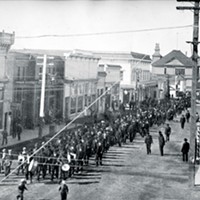Chinese Again in Humboldt, Part Two
The Meeting in Eureka's Union Labor Hall, Oct. 1, 1906
By Alex Service[
{
"name": "Top Stories Video Pair",
"insertPoint": "7",
"component": "17087298",
"parentWrapperClass": "fdn-ads-inline-content-block",
"requiredCountToDisplay": "1"
}
]
Editor's note: This story, which originally appeared in the Ferndale Enterprise, contains quotations that include racist language and slurs.
On Saturday, Sept. 29, 1906, the steamer Roanoke arrived in Eureka's harbor from Astoria, Oregon. Among its passengers were members of the management team for the new salmon cannery about to begin operations at Port Kenyon, 2 miles from Ferndale. Also passengers on the Roanoke were the cannery's workforce consisting of 23 Chinese men, four Japanese men, and six young white women, several of whom were Russian. According to popular wisdom (although in this case, as so often happens, the popular wisdom was wrong), it was the first time since 1886 when any Chinese person had set foot in Humboldt County.
Under the headline "CHINESE AGAIN IN HUMBOLDT," the Sept. 30, 1906 Daily Humboldt Times reported with racist rhetoric and melodrama,
After being free from the foot of a celestial for twenty odd years, and for so long a time being known far and wide as a place absolutely free from coolie labor, Humboldt County saw the return of Chinese within her borders yesterday noon with the arrival of the steamer Roanoke, when the Starbuck-Tallant Company, of Port Kenyon, imported twenty-seven Chinese to work in its cannery on Eel River.
The Chinese were kept aboard the steamer until shortly before four o'clock when a Santa Fe engine backed a box car on the sidetrack beside the warehouse and the pigtails, bag and baggage, were dumped in, the door shut, and the engine returned with the forbidden fruit, to the train, hooked on to the passenger coaches, and pulled out for the valley.
The Times summed up the events of recent months, when the Ferndale Chamber of Commerce had agreed with the Starbuck-Tallant Co. that the cannery could be operated with Chinese workers as long as these men did not leave the cannery grounds and were sent back out of the county at the end of the three-month salmon season. As described in the Times, Humboldt County's Chamber of Commerce had taken "the matter under consideration and condemned the bringing of Chinese labor into the county under any conditions whatsoever." The Times continued, "Practically all labor organizations passed forceful resolutions, objecting to the importation of Chinese, declaring that the first batch would be but a wedge for more." After taking a retrospective look at the events of February of 1885, when Eureka's 300-plus Chinese residents were forcibly expelled, the Times gave this summation of the past 20 years:
From the day that the moon-eyed Mongolians left Eureka until yesterday there were no Chinese here with the exception of a stray fishing boat which would seek Humboldt for refuge and to secure supplies. [This statement ignored the presence of the Chinese men who continued living in Klamath and Orleans, five of whom were listed in the 1900 U.S. Census.] In such instances the Chinks generally kept close to their craft. It is said that even in China Humboldt County is a place looked upon with horror and as a place to give wide berth. Even mothers tell children stories of what they do to Chinamen in Humboldt and instill fear in their youthfull [sic] breasts by saying unless they are good they will be shipped to Humboldt.
The Oct. 2, 1906 issue of The Ferndale Enterprise, in an article simply headlined "Have Arrived," defended the employment of the "Chinamen, a number of Japs and several Russian girls, who were brought here from Astoria to assist in the operation of the salmon cannery to be run in connection with the Port Kenyon Cold Storage plant this fall, which the Tallants affirm cannot be operated without Chinamen." The Enterprise continued, "These Chinamen are not what could be termed 'cheap labor,' as their wages will average, we are informed, from $2 to $4.50 per day. The Celestials are now at Port Kenyon where they are to be kept until the close of the season, and at that time taken away." After recapping the Ferndale Chamber's decision to permit this "importation of Chinese," the Enterprise stated,
The members of the Ferndale Chamber of Commerce and the residents of this section are not in favor of Chinese competing against white labor nor do they wish to see them permanent residents of this valley or the county. The Chamber believes at this time, however, that a cannery cannot be operated other than by Chinese help, and as the successful operation of the establishment means no little money to the valley at large, the organization sanctioned the arrival of the Chinese.
On that same day, Tuesday, Oct. 2, the largest front page headline of The Humboldt Times announced, "THE CHINESE MUST GO! Such was the unanimous sentiment at MASS MEETING LAST NIGHT." The article's sub-heading continued, "Citizens Indignant that Unwritten Law of Humboldt Should Be Violated by Ferndale Business Men and Port Kenyon Cannery — Committee of Fifteen Appointed to Confer with Chamber of Commerce." The article began,
That the twenty-seven Chinese [actually 23 Chinese and four Japanese] ... must be taken out of the boundaries of Humboldt County, and taken immediately, was the sentiment of the mass meeting held at Union Labor Hall last evening. Every available seat was occupied and the entire back of the hall and side walls were crowded until standing room was at a premium. The meeting even overflowed into the hallway. In the immense gathering there were not only men associated with organized labor, but business men and professional men. In fact, every walk of life was represented, even to politicians.
After "Speeches were made by several prominent men" and "the situation had been thoroughly canvassed," the meeting attendees appointed a "committee of fifteen men" to join forces with representatives of the county Chamber of Commerce and go to Ferndale to meet with the cannery's representatives. This echoed the action taken in February of 1885, when a "Committee of Fifteen" elected in a mass meeting had directed the expulsion of the Chinese people of Eureka. The new Committee of Fifteen was directed to explain the situation "to Messrs. Starbuck and Tallant, in a courteous but firm manner, asking that the Mongolians be returned to Astoria or sent elsewhere." Chairman of the committee was H. L. Ricks, who would serve as Eureka's mayor from 1907 to 1909, and whose father C.S. Ricks had owned much of the downtown Eureka property on which Chinatown was located before the 1885 expulsion. According to the Times, H. L. Ricks expressed his opinion at the meeting that "the strongest law in Humboldt is that unwritten law for the past twenty-one years held sacred by every loyal Humboldter and recently ignored and trampled underfoot by a fishing industry from Astoria and a few members sufficient to form a quorum of the Ferndale Chamber of Commerce." Ricks stated his belief that once the committee explained how "loyal Humboldters" felt about their unwritten "strongest law," "a change of sentiment on the part of the management of the cannery would take place."
After Ricks addressed the meeting, Eureka cigar-maker Charles Gambarth spoke at length. (Gambarth's concern about competition from Chinese labor is perhaps unsurprising, since cigar-making was an occupation in which many Chinese Californians worked.) Gambarth declared, "It is the greed of a few men who saw capital in the Eel River that brought the Chinese ... and it was greed on the part of a few members of the Chamber of Commerce of Ferndale that passed the resolution ... permitting Chinese to come here, to enrich themselves at the expense of the whole county."
Gambarth also made remarks which would become controversial in the days ahead: "I understand that not only are there Chinamen, but Japs also, and six white girls. Now, tell me, in the name of God Almighty, what are the six white girls doing among all these Chinese?"
W.S. Clark, who was a former and future mayor of Eureka and was another member of the new Committee of Fifteen, emphatically declared at the beginning of a brief speech, "this is a white man's country and no place for Chinese; we have a few Chinese here in this white man's country and the question now is to get them out."
A follow-up article will tell the story of a week's worth of mass meetings in Fortuna, and the cannery company's response.
Alex Service (she/her) is the curator at the Fortuna Depot Museum.
Speaking of...
-

NCJ Preview: A Final Fish Farm EIR, Hate in Humboldt and Thai Food in Willow Creek
Jul 18, 2022 -

Watch These Spaces
Apr 28, 2022 -

Heading for Charlie Moon Way
Nov 7, 2021 - More »
more from the author
-
Return of The Valley of the Giants
- Nov 2, 2023
-
Not Expelled But Not Fully Welcome
Japanese experiences in Humboldt's Chinese exclusion era, from education to terrorism
- Aug 24, 2023
- More »


































